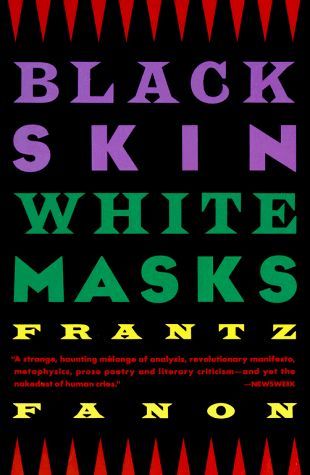
Black Skin, White Masks
A major influence on civil rights, anti-colonial, and black consciousness movements around the world, Black Skin, White Masks is the unsurpassed study of the black psyche in a white world. Hailed for its scientific analysis and poetic grace when it was first published in 1952, the book remains a vital force today. “[Fanon] demonstrates how insidiously the problem of race, of color, connects with a whole range of words and images.” — Robert Coles, The New York Times Book Review
Reviews
Kay so Queso@kisoh
Marion@mariorugu
Winona @notnoni
solitones@solitones
Ciara Renaud@ciararenaud
Mikre @mikre
Martha F.@marthaq
w@neila
yasi@middleschoolbf
Amelia Lang @amylang
akira@knwife
Kristina@kvalendin
KKK@kandid
Ezra Alie@ezraa
Eva Talmadge@evatalmadge
Lindsay Cronk@lindsonmars
Oskar@bruos
Highlights
Kay so Queso@kisoh
Page 179
nhu ⋆𐙚₊˚⊹@nhuelle
nhu ⋆𐙚₊˚⊹@nhuelle
nhu ⋆𐙚₊˚⊹@nhuelle
nhu ⋆𐙚₊˚⊹@nhuelle
nhu ⋆𐙚₊˚⊹@nhuelle
nhu ⋆𐙚₊˚⊹@nhuelle
nhu ⋆𐙚₊˚⊹@nhuelle
nhu ⋆𐙚₊˚⊹@nhuelle
nhu ⋆𐙚₊˚⊹@nhuelle
nhu ⋆𐙚₊˚⊹@nhuelle
nhu ⋆𐙚₊˚⊹@nhuelle
nhu ⋆𐙚₊˚⊹@nhuelle
nhu ⋆𐙚₊˚⊹@nhuelle
nhu ⋆𐙚₊˚⊹@nhuelle
nhu ⋆𐙚₊˚⊹@nhuelle
nhu ⋆𐙚₊˚⊹@nhuelle
nhu ⋆𐙚₊˚⊹@nhuelle
nhu ⋆𐙚₊˚⊹@nhuelle
nhu ⋆𐙚₊˚⊹@nhuelle
nhu ⋆𐙚₊˚⊹@nhuelle
nhu ⋆𐙚₊˚⊹@nhuelle
nhu ⋆𐙚₊˚⊹@nhuelle
nhu ⋆𐙚₊˚⊹@nhuelle